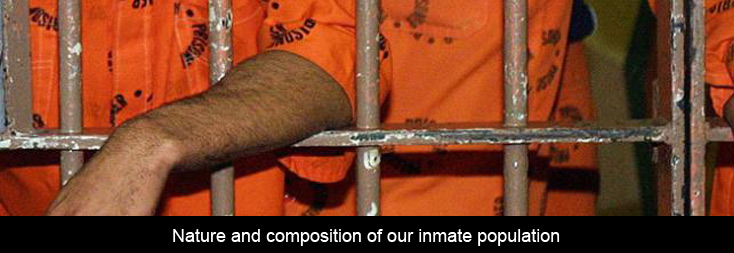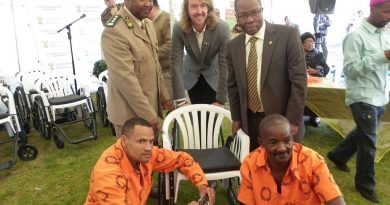Correctional services to encourage education amongst South Africa’s 3,505 female inmates
Correctional Services Minister Sibusiso Ndebele has said that the Department of Correctional Services (DCS) will continue to encourage South Africa’s 3,505 female offenders to be educated.
On Women’s Day (Friday, 9 August), Minister Ndebele joined more than 200 female inmates, including female offenders with babies behind bars, at the Kroonstad Correctional Centre in the Free State. The inmates also played netball and soccer against the popular Bloemfontein Celtics Women’s Football Club. Various items including baby formula, baby clothes, nappies and toiletries were donated to the offenders.
Of the 3,505 female inmates currently incarcerated across the country, 980 are remand detainees and 2,525 are sentenced. Between January and March, 282 mothers were incarcerated with their babies.
Delivering his address, Minister Ndebele said: “It is said, ‘educate a man and you educate one person; educate a woman and you educate a whole nation’. It is for this reason that we will not cease in encouraging, and compelling, offenders to be trained, and educated, whilst in our care.
“As we celebrate Women’s Day, without the total and unconditional emancipation of all women, the liberation of our country, and the African continent, remains incomplete. Gender inequality and the oppression of women, undermine efforts towards the development, and growth, of our economy and, thus, hinder national prosperity. Like we fought colonialism and apartheid, we should continue in our struggle to obliterate racism’s twin sister, sexism. We must resolve to accelerate progress towards gender equality, both in the public, and private, sector as well as society as a whole. We should continuously ask ourselves, what more should we do to ensure that the empowerment, and emancipation, of women becomes a daily reality?
“The late President of Mozambique, Samora Machel, knew that, ‘the emancipation of women is not an act of charity, or the result of a humanitarian or compassionate attitude. The liberation of women is a fundamental necessity for the revolution, the guarantee of its continuity and the precondition of its victory.’
“Many of the heroines of our freedom either had a stint in prison, or served many years for our just cause which was about human freedom, dignity, non-racialism and equality for all. In honour of the many women who were stripped of their dignity by past authorities and apartheid jails, DCS has a special role to play in the rehabilitation of offenders, in particular young offenders, so that they can realise the opportunities that have come with the new dispensation and how they may take advantage of such prospects.
“Indeed, as Muhammad Ali Jinah reminds us: ‘No nation can ever be worthy of its existence that cannot take its women along with the men. No struggle can ever succeed without women participating side by side with men. There are two powers in the world; one is the sword and the other is the pen. There is a great competition and rivalry between the two. There is a third power stronger than both, that of the women.’
“Pass Laws were a cornerstone of the dehumanising, racist and segregationist policies of our collective past. They also underpinned racial capitalism in South Africa. There is no way in which you can explain colonial segregation, and apartheid, without reference to these hated pass laws which destroyed the lives of African people and their families. To a large extent, the anti-segregation, and anti-apartheid, struggle was precisely articulated, and fought, against the much despicable so-called dompass. Women, although they were recruited much later into the liberation movements, were always at the forefront of the battle against pass laws. It was in 1913 when unjust laws were enacted, to reserve 87% of the land in the hands of the White settler minority. This was also the year when the illegitimate Union Government first attempted to make South African women carry passes, when the Orange Free State introduced a new requirement that women, in addition to existing regulations for Black men, must carry reference documents. Led by Charlotte Maxeke in Bloemfontein, hundreds of women rejected, and protested against, the pass laws and their attendant indignity.
“Sol Plaatjie in his book, Native Life in South Africa, records that women in their 1913 anti-pass law campaign said: ‘We have done with pleading.’ Unlike the men in the ANC leadership, who were serial petitioners, the women decided to take the law into their own hands. A number of the Black, and Coloured, women who participated in the anti-pass protests, and demonstrations, in Bloemfontein were imprisoned for their courageous acts of resistance against the intended extension of pass laws. At the beginning of the 20th century, in an attempt to curb the growth and prosperity of the Indian merchant class, government passed a series of restrictions, and laws, targeting the Indian community. The first, organised, open passive resistance against pass laws, in the Indian community, was led by Mahatma Ghandi in the Transvaal in 1906.
“In the fifties, Women’s League leader, Lilian Ngoyi, characterised the pass laws as ‘a badge of slavery in terms whereof all sorts of insults and humiliation may be committed on Africans by members of the ruling class.’ In Langa township, in January 1953, in protest against the impending application of the Native Laws Amendment Act, Dora Tamana, a member of the ANC Women’s League, and the Federation of South African Women, declared: ‘We, women, will never carry these passes. This is something that touches my heart. I appeal to you young Africans to come forward and fight. These passes make the road even narrower for us. We have seen unemployment, lack of accommodation and families broken because of passes. We have seen it with our men. Who will look after our children when we go to jail for a small technical offence – not having a pass?’
“The stories of the anti-pass campaigns tell the story of the struggle for human rights in South Africa. South African judges chose Old Fort (Number Four) Prison, to be the permanent home of the country’s constitutional court, where human rights cases are judged. The exhibitions at Old Fort, Number Four and the Women Gaol offer a national narrative on human rights in post-apartheid South Africa, and show a break with the authoritarian past. Central to defining who we are as South Africans, the Conhil heritage site is central to defining the new South Africa where elements from our violent past are appropriated to create the foundations of a post- authoritarian nationhood (Tony King & M. K. Flynn).
“In 2013, as we commit to another century of women’s emancipation and gender equality, we celebrate that our government has remembered the 1913 Land Act, and the 1913 Women’s anti-pass campaign, by beginning to issue new, secure identity cards as a symbol to a new chapter in the lives of all citizens of this country.
“Women, you are indeed phenomenal,” said the Minister.





